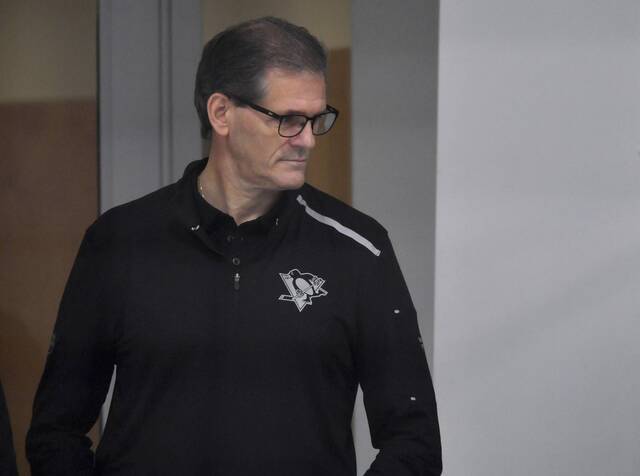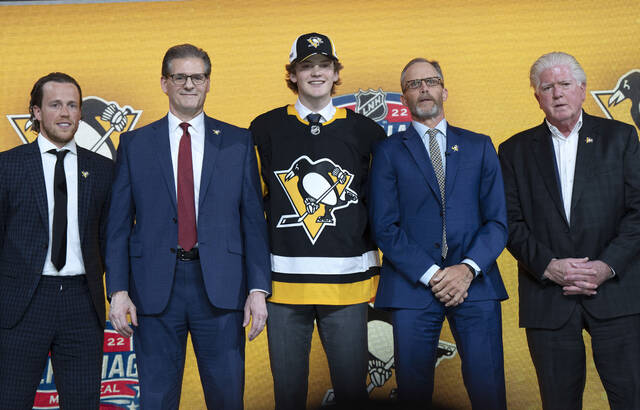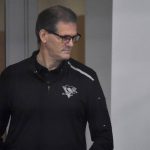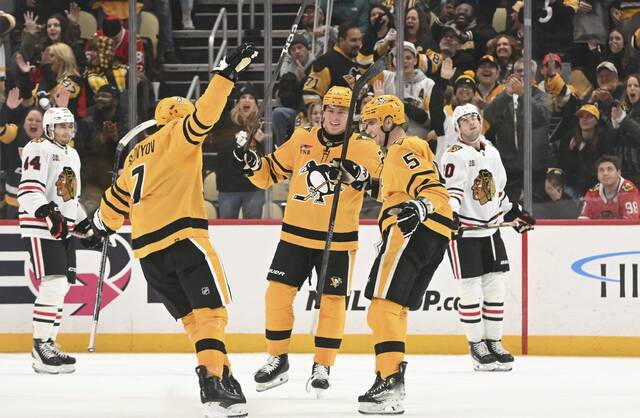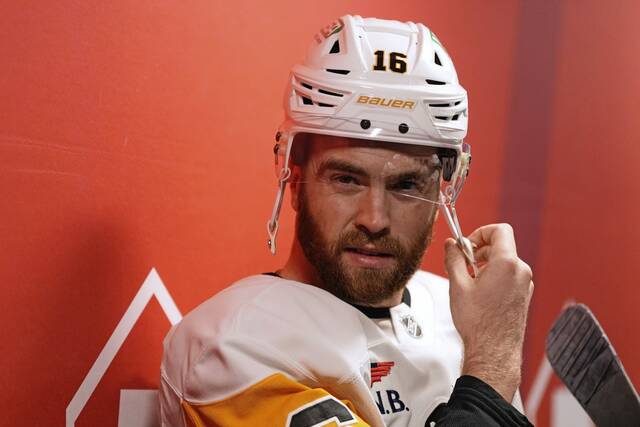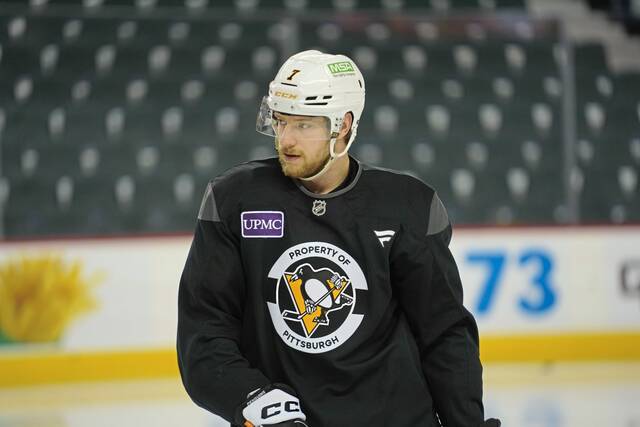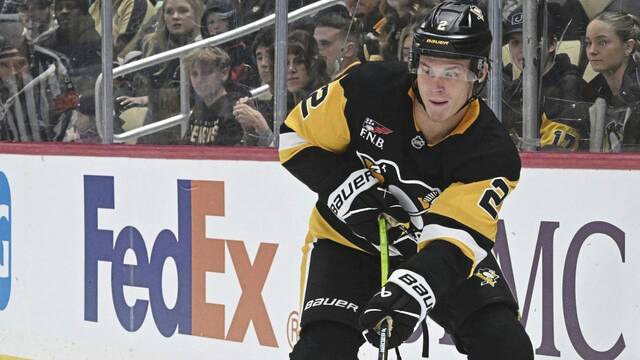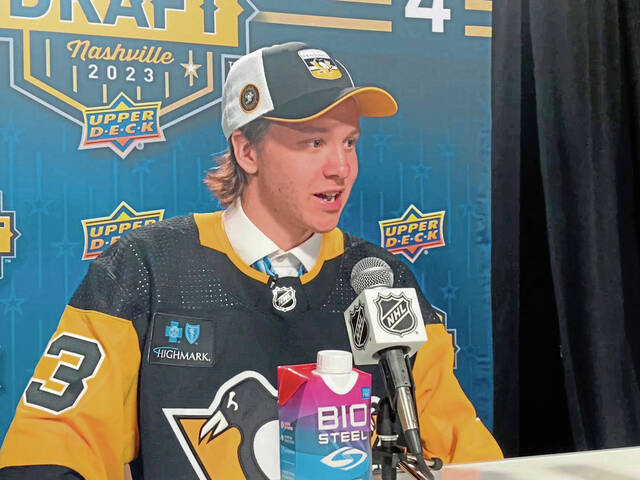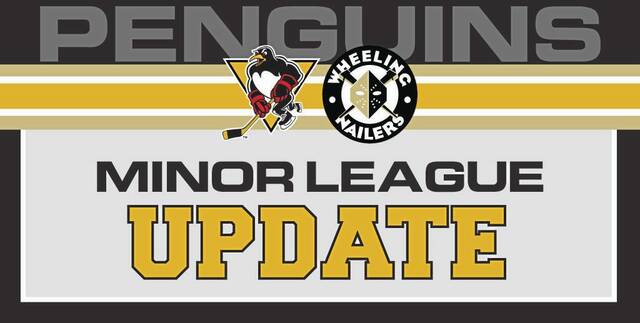At the beginning, it was almost absurd.
Comical, even.
One of the Pittsburgh Penguins’ greatest villains became their general manager.
In the end, he became vilified for completely different reasons few could laugh at (outside Philadelphia).
On Friday, Ron Hextall’s tenure as the 11th general manager in the history of the Penguins came to a much-anticipated conclusion as he was fired by Fenway Sports Group (FSG) after a stint of just over 26 months.
Also jettisoned were president of hockey operations Brian Burke and assistant general manager Chris Pryor, one of Hextall’s closest allies.
The search for “new hockey operations leadership” has already started. FSG executive Dave Beeston indicated Friday constituted “Day 1” of that pursuit.
Management will be handled on an interim basis by director of hockey operations Alec Schall, Wilkes-Barre/Scranton Penguins general manager/manager of hockey operations Erik Heasley and hockey operations analyst Andy Saucier. Coach Mike Sullivan will also provide assistance.
Fenway Sports Group principal owner John Henry and chairman Tom Werner issued the following statement:
“We are grateful to Brian, Ron and Chris for their contributions to the organization over the past two seasons, but we feel that the team will benefit from new hockey operations leadership. While this season has been disappointing, we believe in our core group of players, and the goal of contending for the Stanley Cup has not changed.”
More Penguins
• Ron Hextall’s history of trade deadline deals with Flyers, Penguins
• Mark Madden: Here’s a starting point for the Penguins’ next GM to fix this mess
• A stunning lack of support for veteran stars torpedoed Penguins’ season
• Tim Benz: Penguins find comically fitting way in Columbus to end ‘failure of a season’
Neither Hextall, who had one year remaining on his contract, nor Burke answered phone calls requesting comment.
Via Twitter, Burke wrote:
“I am grateful for the opportunity to have worked in this passionate sports town. Thank you to FSG, Mario Lemieux, David Morehouse, management and coaches, and especially to our great group of players. Best of luck to the Penguins and their incredible fan base in the future.”
Hextall’s hiring Feb. 9, 2021, came under strange circumstances.
A few weeks after previous general manager Jim Rutherford had abruptly resigned in the early stages of the pandemic-shortened 2020-21 season, Hextall was brought on at a time when the NHL and the Penguins were dealing with cumbersome realities brought on by covid-19.
The introductory press availability for Hextall and Burke had to be conducted via a video conference — as opposed to a news conference — because of the pandemic-era rules for social distancing.
Former team president and CEO David Morehouse — who, along with former majority owners Mario Lemieux and Ron Burkle, made the decisions to hire Hextall and Burke — lauded each executive as “two of the greatest minds in hockey.”
“I think they’re the two along with coach (Mike) Sullivan that are going to take us in a direction we’re used to being taken,” Morehouse boasted. “Nothing’s changed. We’re the Pittsburgh Penguins, and we’re here to win.”
Current president of business operations Kevin Acklin was involved in hiring Hextall and Burke at that time.
“I’m not going to speak for prior ownership as to what their decisions led to,” Acklin said Friday. “This is intensely difficult. You have two quality human beings who have families, who are very well respected in hockey circles. Not everything that happened to the team is their fault. I think everybody can take that into account. But (Hextall) and (Burke) were hired at the time because the ownership in place at the time felt that they were best to move forward.”
Just over two years later, the Penguins compiled five playoff wins. That total might have been higher had the team even qualified for the 2023 postseason.
Hextall’s tenure of managing the roster was mostly characterized by miscues, though there was some early success with what was arguably his signature acquisition as Penguins general manager, veteran center Jeff Carter. Hextall plucked Carter from his previous employer, the Los Angeles Kings, at the 2021 trade deadline.
Carter offered marvelous contributions in the 2021 postseason as he led the East Division champion Penguins in scoring with four goals in six playoff contests. He supplemented that success in 2021-22 by generating a strong 45 points (19 goals, 26 assists) primarily serving as the Penguins’ third-line center.
That production proved to be something of a Trojan horse, however, as it motivated Hextall to offer a two-year contract extension to Carter in January 2022. This past season, Carter’s production dipped to 29 points (13 goals, 16 assists) and his overall play lagged to the point that he was dropped to the fourth line.
Carter’s deal will linger for one more year, and there are few options around it. With a salary cap hit of $3.125 million, Carter’s contract contains a no-movement clause so a transaction such as a trade would require Carter’s approval (assuming there would be a suitor willing to take on a declining, aging player). Even something as simple as waivers or an assignment to Wilkes-Barre/Scranton of the American Hockey League is not permitted. And given that Carter was over the age of 35 when the deal was signed, a buyout would provide no salary cap relief.
Hextall’s greatest triumph was the acquisition of skilled winger Rickard Rakell from the Anaheim Ducks at the 2022 trade deadline. Since his arrival, Rakell, 29, has found chemistry playing with either franchise center, Sidney Crosby or Evgeni Malkin, and came through with 60 points (28 goals, 32 assists) in 82 games this past season. Hextall deftly managed to re-sign Rakell to a six-year contract extension with a tidy salary cap hit of $5 million last offseason.
Beyond that, most of Hextall’s augmentations to the Penguins did not have the desired effect.
During the 2021 offseason, after trading away intriguing but inconsistent winger Jared McCann in a deal primarily motivated by a restricted salary cap situation, Hextall allowed the incoming Seattle Kraken to take energetic bottom-six forward Brandon Tanev in the expansion draft. Today, each of those players has played key roles in the second-year franchise reaching the postseason.
In an effort to replace Tanev, Hextall’s most notable offseason addition in 2021 was to sign unremarkable checking winger Brock McGinn to a four-year contract worth $2.75 million a season. By this past March, McGinn was waived and then traded to the Ducks simply to clear him off the payroll.
For better or worse — most likely the latter — Hextall’s most impactful offseason came in 2022. While he met a daunting task by finding a way to re-sign aging superstars such as Malkin (four years — $6.1 million cap hit) and defenseman Kris Letang (six years — 6.1 million) — as well as key supplemental pieces such as Rakell and forward Bryan Rust (five years — $5.125 million) to manageable contract extensions that allowed roster flexibility, he nullified much of that success with maneuvers that misfired.
On July 5, a few days before the NHL Draft, Hextall quietly re-signed backup goaltender Casey DeSmith to a two-year contract. This past season, DeSmith played in a career-high 38 games but rarely instilled confidence or even provided true competition to starter Tristan Jarry on the infrequent occasions the latter was healthy.
Perhaps the most consequential day of Hextall’s tenure with the Penguins was July 16, 2022.
After dealing away defensive defenseman John Marino, a promising player who appeared to stall out in his development, to the New Jersey Devils in exchange for offensive defenseman Ty Smith (and plenty of salary cap space), Hextall brought in veteran defenseman Jeff Petry and bottom-six forward Ryan Poehling in exchange for defenseman Mike Matheson, a reclamation project under Rutherford who appeared to get his career pointed in the right direction the season prior.
Petry and fellow right-handed defenseman Jan Rutta, brought in on the first day of the free-agent signing period three days prior, were expected to retool a group of defensemen and provide some element of stoutness near and around the net while still providing a modicum of skill suitable for the Penguins’ aggressive approach.
Injuries hobbled Petry and Rutta throughout portions of the 2022-23 season. And when they were able-bodied, they rarely seemed at ease with their duties.
As for Smith, a one-time first round pick (No. 17 overall in 2018), he largely lingered in the AHL because of the team’s limited salary cap flexibility, a situation created by Hextall and company.
One of the maneuvers that created that congestion was the decision to re-sign restricted free-agent winger Kasperi Kapanen on July 21 to a two-year contract with a $3.2 million salary cap hit — identical to his previous deal — despite having a poor 2021-22 season. The skilled but frustrating Kapanen rewarded that faith by producing a mere 20 points (seven goals, 13 assists) in 43 games before he was waived and claimed by the St. Louis Blues in February.
Useful and versatile forward Evan Rodrigues was allowed to depart as an unrestricted free agent after it was assumed he would get a lucrative offer outside of the Penguins’ range. As it turned out, Rodrigues may have overpriced his talents and had to settle for a one-year contract worth $2 million with the Colorado Avalanche in mid-September, a few days before training camps opened.
The Penguins largely were unremarkable for the first three months of the season but appeared to be a viable playoff contender during that span, even with some considerable shortcomings. But once the calendar flipped to 2023, the team began to lose traction, and flaws in the roster’s composition became more pronounced.
Hextall tried to correct issues with a handful of deals around the trade deadline. After clearing out Kapanen, McGinn and longtime fourth-line center Teddy Blueger (who was dealt to the Vegas Golden Knights on March 1), forwards Mikael Granlund and Nick Bonino and defenseman Dmitry Kulikov were all added to the mix.
Granlund was the most successful of that trio, strictly because he didn’t suffer any kind of injury. Though, when he was in the lineup, it was hard to tell what kind of impact he was expected to make as he largely looked unsure of what his tasks were. With two years left on his contract at a salary cap hit of $5 million, the 31-year-old Granlund can only get better after his first 21 games with the Penguins.
Bonino, a hero from the franchise’s Stanley Cup titles in 2016 and 2017, played in three games before he was lost for the season with a lacerated kidney while Kulikov, a sturdy journeyman veteran, was limited to six games due to a suspected left foot injury.
Regarding the franchise’s prospect pool, Hextall made earnest efforts to increase the organization’s depth. With limited draft capital to operate with due to Rutherford’s cavalier approach to future assets, Hextall tried to be aggressive with undrafted free agents such as forwards Corey Andonovski and Ty Glover, though it’s premature to gauge what kind of impact they may offer.
And while Hextall dealt away a few second- or third-round picks to add the likes of Carter, Rakell and Granlund, he did retain the one first-rounder he had to work with and selected promising defenseman Owen Pickering during the 2022 NHL Draft.
Hextall’s two-plus years on the job weren’t strictly a string of failures. There were some viable contributions that will have lasting ramifications for the Penguins for many years, most notably the retention of franchise pillars such as Malkin and Letang as well as the addition of a legit top-six winger in Rakell or even Pickering many years from now.
“We will not get outworked,” Hextall said the day he was hired. “We will come up with a plan and every day to try and become a better hockey club.”
That plan has led to the Penguins missing the postseason for the first time since 2006.
When that happened, the organization fired one of the most important figures in the history of the franchise, general manager Craig Patrick, the man who turned the woebegone Penguins into a Stanley Cup contender once upon a time.
Hextall did nothing of that sort and might have accomplished the opposite during his brief tenure with the Penguins.



